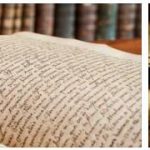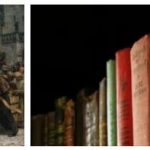
Germany Literature – From 1180 to 1350 Part II
Faced with the art of his two predecessors, in which the somewhat frivolous atmosphere of court life is still reflected, stands the solitary and severe high spiritual world of Wolfram von Eschenbach, the greatest poetic genius of the Germanic Middle Ages, the poet of Parzival, of which it is only known that he was of a noble family of central Franconia, who between 1203 and 1215 lived at the court of the Landgrave Hermann of Thuringia, and who, being illiterate, had French poems read and dictated their translation.
According to ANIMALERTS, the legend of Parsifal, the story of the “pure madman”, is indeed the most beautiful in all medieval poetry in Europe, and Wolfram, by elaborating it, has been able to infuse it with a profound moral significance. Whatever source or sources he used (see W olfram von eschenbach), the human matter of the poem fully belongs to him. Above the monotonous world of aviation, out of the childish and false faith of the poetry of his contemporaries, Wolfram raises us into an atmosphere of deeply felt faith, made of humility and innoeence and at the same time of a mystical impulse towards the secrets of God, in a conception of union of Christian and chivalric ideals as the highest perfection of life; out of the artificial morality of love, we enter the zone of a healthy natural morality and a faithful conjugal love, to which a saving and redeeming power is attributed; outside the constraints of the convention, we are raised to a free human conception that brings with it the urge to sin, but also liberation from sin. Defects of composition, prolixity, display of erudition, obscurity and abstruseness of thought, inconsistencies of development do not prevent theDante’s comedy. Two other compositions by Wolfram remained unfinished, the Titurel of original invention, and the Willehalm, derived from a French source, but with a spirit of tolerance and a sense of humanity which the French source was unknown. With these works the German chivalric epic has ended its golden age: the followers will only walk in the footsteps of the three great masters, continuing their work or counterfeiting their way, proving originality only by exaggerating the defects of their models, although the pure form created by them nevertheless continues to dominate literature until beyond the end of the thirteenth century.
Under Hartmann’s influence are all those mediocre geniuses who after him composed the so-called Arthurian novels: Ulrich of Zatzikhoven of Thurgau with his Lanzelet, Wirnt von Gravenberg, Bavarian, with Wigalois, Henry of Türlin, Carinthian, with his Crown (Aventure Crône), the Stricken, a Franconian native, better known for the jokes of his Pfaffe Amis than for his Daniel vom blühenden Tal. Wolfram’s manner is found in the mammoth Jüngere Titurel of a Bavarian of about 1270; in a Lohengrin also composed in Bavaria a few years later; in Holle’s Bertoldo and Eschenbach’s Ulrich, which they mixed domestic motifs with romantic traditions in their poems; while Godfrey of Strasbourg exerted his influence, as well as on his two followers, Ulrico von Türheim and Enrico von Freiberg, on two fruitful Alemannic poets: Rudolph of Ems and Conrad of Würzburg. The first, author of vast poems on religious legends: Barlaam and Josaphat, saturated with ascetic spirit, or chivalry: William of Orleans (Wilhelm von Orlens), or of classical antiquity: Alexander the Great, or of biblical history: the universal Chronicle (Weltchronik), exhausts his talents as an artist in the elegance of the prolix form; the second, artist and poet who amazed his contemporaries with the fertility of his spirit and the agility of his verse, composed with religious intentions the allegory the Reward of the world (Der Welt Lohn), and the Forge of gold (Die Goldene Schm iede), in which he collected all that lived on images and comparisons in the popular and literary tradition around the Virgin; in addition to a large number of ballads, songs and lai, he rhymed the legends of Sant’Alessio and Pope Sylvester; dealt with a lot of finesse frankly novelistic themes without moral disgressions in Engelhart, who elaborates a motif from the fables of friendship, and in Herzmäre, which contains the story of the husband who makes his wife eat his lover’s heart; and dealt with a historical theme in the great poetic novel the Trojan War (Trojanerkrieg), unfinished: a characteristic document, with its 40,000 lines, both of the effort to infuse the spirit of the German thirteenth century into classical matter, disguising the ancient in medieval tendency to enlargement, to which the prolixity of the style drew him.
But the spirit of the golden age had almost vanished from minds and hearts: the splendor of the cavalry was gradually fading, so that Ulrich of Liechtenstein, who around 1250 tried to revive it with his Frauendienst, was unable to than to involuntarily parody it. And already the opposition to the ideals of Hartmann’s time, which was beginning to emanate from the ever more realistic character of the time, is stated in some works, that in the midst of the dull uniformity of the followers shows some original traits: Wernher der Gartenäre, treating in the his Meier Helmbrecht the story of a Bavarian peasant who out of vanity becomes a marauder knight, is the first to fashion, independently and outside the fixed themes of tradition, a material drawn from reality, describing the aristocracy in a heroic-comic tone, with sharp features barbarity.








